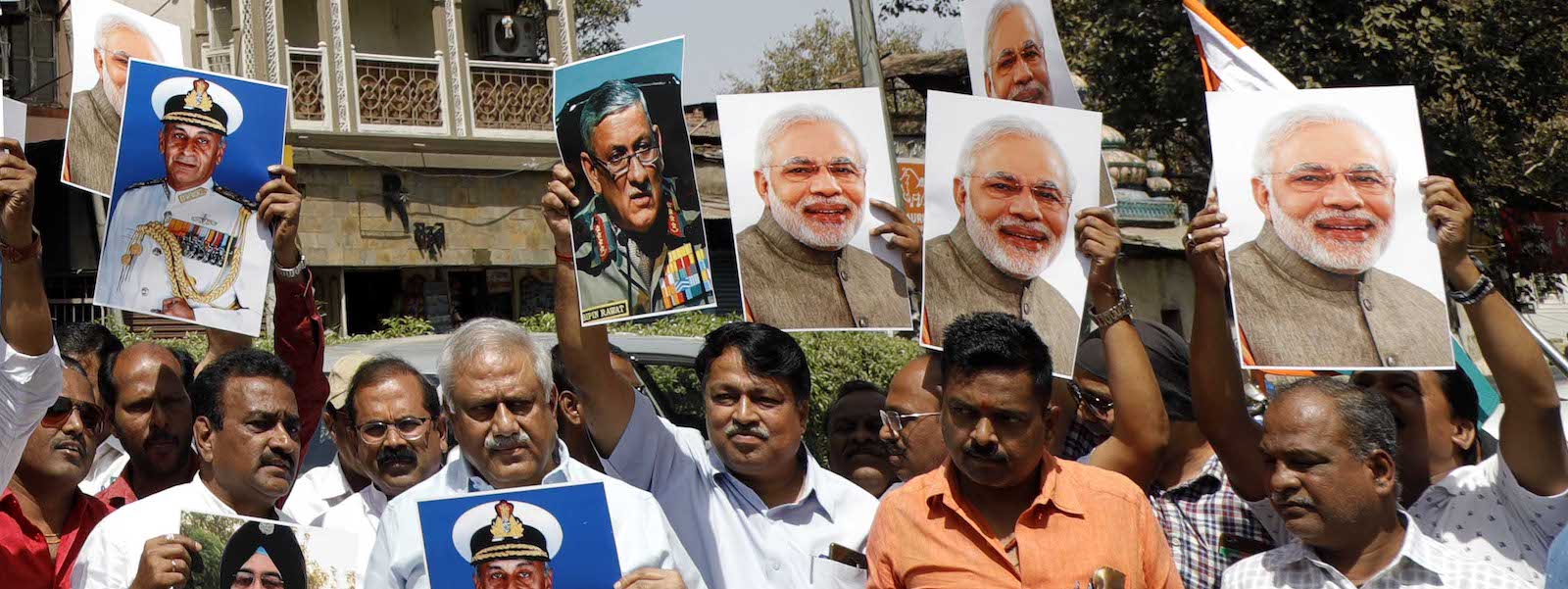Thursday 07 Mar 2019 SYDNEY

Indians celebrate the Indian air strike in Pakistan (Photo: Rahul Raut via Getty)
By Priya Chacko
On Tuesday, India launched air strikes targeting what it claimed was the biggest training camp of the militant group, Jaish-e-Mohammed (JeM) near the town of Balakot in the Khyber Pakhtunkhwa province of Pakistan. The strikes were said to be aimed at preventing an imminent attack on India and succeeded in killing hundreds of militants. Earlier this month, the JeM claimed responsibility for an attack that killed 40 Indian security personnel.
India’s air strikes and Pakistan’s response are a major shift in the India-Pakistan conflict which has taken many commentators by surprise.
In the wake of the strikes, the Indian government was at pains to avoid conflict escalation. The strikes were characterised as “non-military pre-emptive action” which were carefully planned to avoid civilian causalities. The ruling Bharatiya Janata Party (BJP) has instructed its spokespeople to adhere to the line that the strikes were pre-emptive, conducted responsibly, targeted at JeM terrorists, and aimed at preventing an imminent attack on India. Foreign governments were told that India did not seek further escalation.
Pakistan initially responded by claiming that the Indian strikes caused minimal damage and did not result in casualties because the Indian aircraft were detected by the Pakistani air force. After intensifying shelling across the Line of Control in Kashmir, on Wednesday, Pakistan launched its own air strike on what it called a “non-military target” in Indian-controlled Jammu and Kashmir from Pakistani airspace. The purpose of this strike, according to Pakistan’s Prime Minister Imran Khan was to demonstrate Pakistan’s “right, will and capability for self-defence”. He too claimed to have no desire for the further escalation of the conflict.
India has claimed that the air strike missed its target, which was actually a military installation. In the ensuing aerial confrontation, both sides claimed to have shot down aircraft and Pakistan later released video of a captured Indian pilot.
India’s air strikes and Pakistan’s response are a major shift in the India-Pakistan conflict which has taken many commentators by surprise. The decades-long territorial dispute over the region of Kashmir has led to several wars. But it has been assumed that the nuclear-armed status of the two countries since 1998 meant that neither would risk this type of conflict escalation.
But this assumption always underestimated the extent to which India’s policy of strategic restraint was a political choice made by successive governments led by the BJP’s Atal Behari Vajpayee and the Congress party’s Manmohan Singh from around 2000, and due to factors other than nuclear weapons. Likewise, a specific political and economic context shaped Pakistan’s approach to India in the last two decades.
Vajpayee and Singh were eager to “de-hyphenate” India from Pakistan in the global imagination, assert India’s status as a rising major power with interests beyond South Asia and focus on India’s rapidly growing economy.
On the Pakistani side, though, General Pervez Musharraf initially scuttled the India-Pakistan back-channel talks initiated by then prime minister Nawaz Shariff, who he toppled in a coup. Musharraf seemed to change his thinking about the conflict after surviving an assassination attempt by splinter cells of JeM in 2003. The economy was also a concern for the normally belligerent Pakistani army whose development plan was at risk without a high-growth economy. In addition, Pakistan was a key player in the United States’ “war on terror” and under pressure to rein in the militant groups used to target India.
India and Pakistan are now led by very different governments in changed economic and political circumstances. The growing US disengagement from Pakistan and China’s massive investments in the country has changed the political and economic game for the Pakistan army. Pakistan is led by a new prime minister whose rise to power owes much to his relationship with the Army.
The current Indian government’s strategy is shaped by the National Security Advisor Ajit Doval, who has long equated strategic restraint with appeasement. It has a Prime Minister, Narendra Modi, whose populist politics depends on the creation of enemies against whom he must protect the nation. Modi’s “strong and decisive leadership” against militants will be an important theme in the upcoming national election, particularly because he has found few solutions to India’s entrenched economic problems, such as “jobless growth” and has made matters worse with ill-conceived policies like demonetisation.
This all points to a new era of turbulence in India-Pakistan relations and a new period of suffering for the people of Kashmir.
